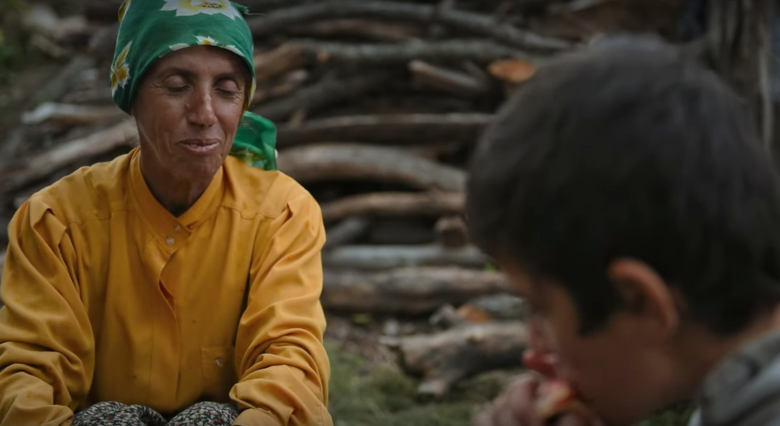In a rural area in North Macedonia, a woman, Hatidze, leads a simple life harvesting honey and living with her elderly mother. Her routine is disturbed when a family moves into one of the empty homes next door. Her previously quiet existence is eradicated by the many loud children and arguing mother and father. Directors Tamara Kotevska and Ljubomir Stefanov take this obscure topic and turn it into a emotional portrait of a woman’s life.
Honeyland is filmed in pure cinema verité. The camera is entirely observational, eschewing the talking heads that dominate most of modern documentary films. There are no sidebar interviews, no archival footage, and no narration to structure the film. Instead, the camera carefully watches as Hatidze’s life changes. The lack of artifice lends authenticity the film’s story. While there is a clear conflict driving the plot, it never feels contrived.
The film takes advantage of the beautiful Macedonian countryside. Hatidze lives far from any city and much of the screentime is her roaming the rocky hills as she gathers her honey. The filmmakers often shoot her in silhouette, like the lone hero of a western, as she goes on her walks. They make heavy use of the titular honey’s color palette. The color grading favors golden hues of sunlight and the glistening yellows of Hatidze’s crop.

Despite its limited scope, Honeyland touches on many issues. It’s unclear how the filmmakers arrived at Hatidze as subject for a documentary, but her life raises many questions. She is in her early fifties but lives only with her octogenarian mother who is mostly bedridden. There is untold history in every wrinkle in her skin and her mother’s withered hands. As she bonds with one particular neighbor boy who sees things from her perspective, he asks the unspoken question “Why do you live here?” She has no power, no running water, and little in the way of companionship outside of her mother and some pets. The answer, delivered by Hatidze and the film itself, is quietly heartbreaking. Not because of a calamitous event, but because of the banality of the sequence that led to her current life.
The film’s other theme is sustainability and capitalism. Hatidze is careful to harvest a limited quantity of honey from her hives, mitigating the damage to the colonies. She doesn’t need or want much to provide for her mom and herself, but her neighbors have a different approach. They bring in several crates to house new beehives, as opposed to Hatidze’s natural hives in rock formations, and are pressured by a local merchant to produce a large quantity, despite the potentially destructive effects to not only their bees but also to Hatidze’s. Unlike her, they have a large family and the father wants to provide for them. This too has a tragic element. It’s a microcosm of how the desires of modern life and the requirements of capitalism can favor short term gains at the expense of long term prospects.
Documentaries like this succeed or fail on their subjects and Hatidze’s story has more layers than could ever be expected. Her modest living, the impact of her new neighbors, and the filmmakers’ commitment to an unobtrusive vision make Honeyland a compelling look at a tragic and humble life.

4/5 stars.
